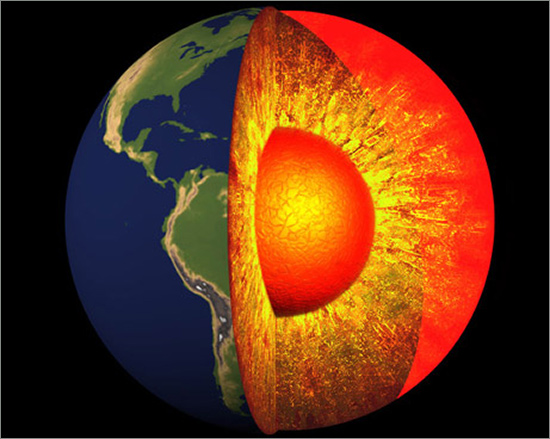
Earth's Core, Magnetic Field Changing Fast, Study Says
National Geographic
25 Settembre 2008
Rapid changes in the churning movement of Earth's liquid outer core are weakening the magnetic field in some regions of the planet's surface, a new study says.
"What is so surprising is that rapid, almost sudden, changes take place in the Earth's magnetic field," said study co-author Nils Olsen, a geophysicist at the Danish National Space Center in Copenhagen.
The findings suggest similarly quick changes are simultaneously occurring in the liquid metal, 1,900 miles (3,000 kilometers) below the surface, he said.
The swirling flow of molten iron and nickel around Earth's solid center triggers an electrical current, which generates the planet's magnetic field.
(Learn more about Earth's interior.)
The study, published recently in Nature Geoscience, modeled Earth's magnetic field using nine years of highly accurate satellite data.
Flip-Flop
Fluctuations in the magnetic field have occurred in several far-flung regions of Earth, the researchers found.
In 2003 scientists found pronounced changes in the magnetic field in the Australasian region. In 2004, however, the changes were focused on Southern Africa.
The changes "may suggest the possibility of an upcoming reversal of the geomagnetic field," said study co-author Mioara Mandea, a scientist at the German Research Centre for Geosciences in Potsdam.
Earth's magnetic field has reversed hundreds of times over the past billion years, and the process could take thousands of years to complete.
The decline in the magnetic field also is opening Earth's upper atmosphere to intense charged particle radiation, scientists say.
Satellite data show the geomagnetic field decreasing in the South Atlantic region, Mandea said, adding that an oval-shaped area east of Brazil is significantly weaker than similar latitudes in other parts of the world.
"It is in this region that the shielding effect of the magnetic field is severely reduced, thus allowing high energy particles of the hard radiation belt to penetrate deep into the upper atmosphere to altitudes below a hundred kilometers (62 miles)," Mandea said.
This radiation does not influence temperatures on Earth. The particles, however, do affect technical and radio equipment and can damage electronic equipment on satellites and airplanes, Olsen of the Danish space center said.
Keep Watching
The study documents just how rapidly the flow in Earth's core is changing, said Peter Olson, a geophysics professor at Johns Hopkins University in Baltimore, Maryland, who was not involved with the research.
By using satellite imagery, researchers have a nearly continuous measurement of changes, he said.
"They provide a good rationale to continue this monitoring longer," Olson said.
Kimberly Johnson
Source > National Geographic News